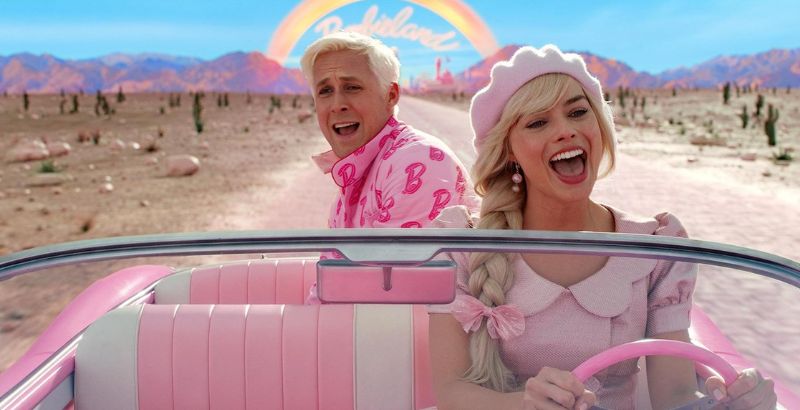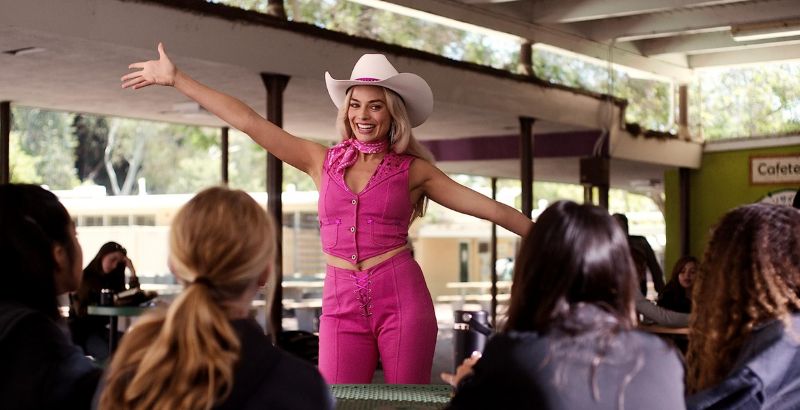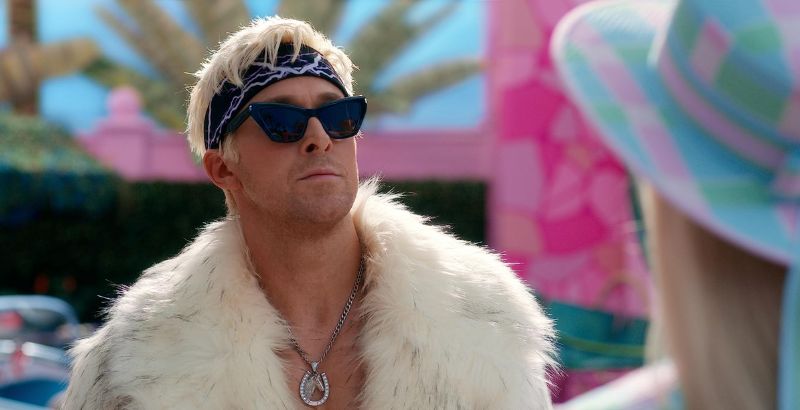
Come on y’all, let’s go to Barbieland in Greta Gerwig’s Barbie, a triumph of converting IP into a fun, thoughtful movie. Every day in Barbieland is perfect, but is it really? Things start going awry so Barbie (Margot Robbie) and Ken (Ryan Gosling) venture out of Barbieland into the Real World to find the source of the mishap and fix it before it’s too late. Barbie is as hilarious as it is heartful while maintaining a perfectly aware metacommentary merged with a not-so-subtle direct conversation about consumerism, feminism, and the need to heal our inner child.
The first and most impressive feat of Barbie is the fact that it tells a PG-13 story about a toy typically enjoyed by small children without a single bit of fuss. Nobody is mistaking Barbie for a children’s movie. And they shouldn’t. The drama is sophisticated and the humor is adult. While there is a key piece of the movie that felt held back, perhaps by industry expectations, Barbie really stays true to its absurd conceit without kowtowing to the Hollywood trend towards softening adult movies for younger audiences.
Humor is Barbie’s first tool of success. Laughter was constant throughout, but especially during its opening salvo. The music, Robbie’s facial expressions, Helen Mirren’s narration, and the battalion of Barbies and the cavalcade of Kens filling out Barbieland made for one of the best opening sequences of the year. There are two kinds of humor going on at once: a meta Barbie-based humor where the gag is constantly at the behest of what it means to bring a Barbie world to life, and a more grounded humor where the characters are simply giving it their all.
Gosling, of course, gives the absolute most by a landslide among the Kens. The other Kens are either there for cameos or relegated largely to background characters. Simu Liu’s Ken is the second most important Ken and by comparison to just how much Gosling gives to every scene, Liu and the rest fall short in both screen presence and substance. The relationship between Gosling and Liu’s Kens starts off with promise but falls just short when the end of their story culminates so quietly when everything else about Barbie is bombastic and on the nose. I do love the Barbies though. Issa Rae is probably my favorite, but they’re all great.

So much of this movie is on the nose, but it pulls it off almost flawlessly. The prologue is an epic pastiche and the narrator’s extended monologue perfectly situates the tone of the movie in a precarious place between commentary and sincerity. Without saying too much, the movie begins by opining upon Barbie’s history as a real-life product, its place in the feminist movement, and the effect it’s had on women the world over since its inception. This narrative is at once tongue-in-cheek in the funniest and most obvious of ways but also layered with the notion that perhaps this is the narrative some people genuinely believe is true and is certainly the narrative on which Gerwig’s Barbieland is built.
On the whole, Barbie’s movie-long conversation about feminism and Barbie’s place in it is excellent and nuanced. As Barbie herself goes on a journey across the movie, we watch her first learn the truth about the feminine ideal, then about masculinity, and finally, about what it means to find your own way in a world filled with gendered expectations and realities. The conversation the movie is having with the audience is astute, paced to begin in a place of clear absurdity, swing you into an opposite type of unreality, and then slowly wiggles its way into a middle ground where maybe things aren’t exactly fair, but they’re definitely realistic and, to a small degree, aspirational.
The Ken of it all is equally fascinating and hilarious. Gosling and the rest of the Kens are the center of some of the best song and dance numbers (though don’t get me wrong, Robbie and the Barbies have some excellent ones.) But while Barbie is on her own journey of self-discovery, Ken is out there learning a lot too. Again, without saying too much, the Kens bring forth one of the movie’s biggest twists and with that, raise some of, to me, the most interesting questions about masculinity and feminism that remained a bit unanswered.
Chiefly, there is tension boiling slowly between Robbie and Gosling’s characters, having to do with mutual respect, that poignantly asks whether Barbies and their impact were just for, or ought to have been just for girls. It’s such a profound moment that Gosling absolutely nails dramatically in the midst of an otherwise very comedic performance, and one of my bigger disappointments (though small in the grand scheme of the movie’s success) was never quite putting that question to rest in the kind of outright way that many of the film’s other questions enjoy.
The other bigger rub for me was the movie’s complete lack of explicit queerness and the way that the obviously queer components were played for some of the movie’s most meager laughs. First, there’s the question of Allan (Michael Cera). If you’re going to make a joke about all of Ken’s clothes fitting Allan too with a wink and nod, I’d really like to see the movie, even if not through Allan specifically, acknowledge that Barbies, Kens, and the like were important parts of the childhood of so many queer men. Ncuti Gatwa, whose sexuality is not public business but who famously plays a gay character in his most well-known TV role Sex Education, is played as the most clearly flamboyant of the Kens more often than not. Yet, he has one of the most overtly heteronormative lines in the movie. The jokes about certain other discontinued Kens didn’t especially land either, feeling out of tone with much of the rest of the movie for how shoehorned they were into their scene. When the movie culminates and asks us to ponder feminism as it pertains to the world we live in today, its lack of explicit queerness didn’t take away from its power, but I certainly feel like it could have added substantially to it.

The most controversial part of the movie may likely be Ariana Greenblatt and America Ferrera’s roles. They represent two different generations and their relationships to Barbie as both a literal toy and as a symbol. The work between the two of them outside of the larger commentary is solid. It’s a good mother-daughter tale that feels real from the start and satisfying by the end. But when it comes to the lessons the two of them learn and what we’re supposed to take away from it all, there will be vastly different reads on the intention of the conclusion and what it says about feminism and masculinity in the real world.
Fortunately, the powers that be behind Barbie understood the necessity of poking fun at consumerism so as to not let that be a distraction from the feminism conversation. While Will Ferrell as the CEO of Mattel had jokes that flagged between hit and miss, the role he and the rest of Mattel play in the movie is fairly spot-on. It maybe overstays its welcome at a few points, but generally, I like the way that it served the comedy, the plot, and the commentary on the whole. I wouldn’t recommend other IPs go about attempting to replicate this metatextual style, the movie walked a very thin line between going too far and doing just enough with meta jokes. It wasn’t successful at every single turn, but on the whole, definitely aces thanks to an astute script from Gerwig and writing partner Noah Baumbach.
Of course, one of Barbie’s most important draws was its style, and that is without a doubt one of the top reasons to see the movie alone. Everything is just gorgeous. I had one hitch in an early dance number where things felt too dimly lit and lacking in the amount of pop that I feel the scene deserved compared to nearly every other scene prior and post. There was also a late-movie song and dance where the sound mixing was a bit off, rendering the instruments quite loud and the vocals too soft to fully understand every word being sung. It didn’t pull me out of the scene at all, it was maybe my favorite dance number in the whole movie, but it did have me wishing for subtitles because there were whole lines I just couldn’t hear. I also found a few times, especially in one early scene, where the camera was moving too fast and the blurriness made me temporarily dizzy. But on the whole, from the endless amazing outfits, to the perfectly rendered sets and playful backgrounds, to bop after bop on the soundtrack, this movie is a visual and auditory feast.
Barbie is a masterwork. It’s as thoughtful as it is funny with a few snags here and there but on the whole, feels like a triumph in IP movie-making.
Barbie is playing in theaters July 21st.
Barbie
-
Rating - 8.5/108.5/10
TL;DR
Barbie is a masterwork. It’s as thoughtful as it is funny with a few snags here and there but on the whole, feels like a triumph in IP movie-making.




